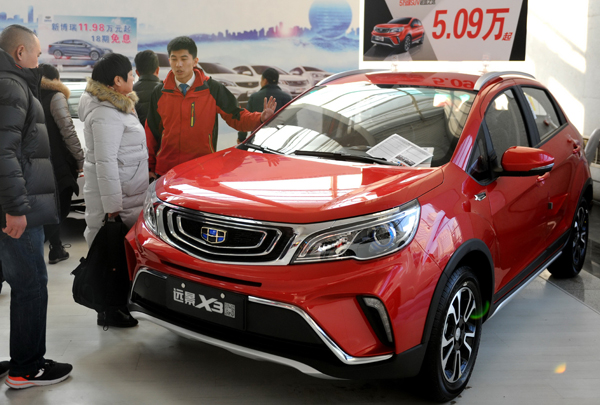Experts: Allowing favorable tax policy to expire will dent growth


But move likely to ensure market's long-term stability
A purchase tax discount that has driven up China's car sales in the past two years is set to expire by the end of this month, aggravating the already less than rosy picture of the world's largest car market in 2018.
Introduced in late 2015 to buoy up weak market demand, the 50 percent discount on the usual 10 percent purchase tax on cars with engines no larger than 1.6 liters-one of the most popular segments in the country-once worked like magic.
Before the measure was introduced, monthly sales had been in the red for three months in a row. After the policy was put in place, the stimulus immediately conjured up 13.3 percent, 23.7 percent, respectively, and then 18.3 percent growth in passenger cars in October, November and December in 2015.
The momentum continued well into 2016. The government's announcement later that year that it would cut the discount to 25 percent in 2017 also resulted in a shopping spree, as people sped up their purchasing decisions. That brought about a nearly 15 percent growth in passenger cars sales overall in 2016, with sales of cars eligible for the discount surging 21.4 percent year-on-year.
"Its [the policy's] effects have become weaker this year," said Xu Haidong, an assistant to the secretary-general of the China Association of Automobile Manufacturers.
Statistics from the association show that sales of cars with engines no larger than 1.6 liters totaled 15.13 million from January to November this year, a 2 percent dip from the same period last year.
That accounted for 68.5 percent of passengers car sales, 2.7 percentage points lower year-on-year.
This, coupled with factors including the country's general economic environment, is likely to cause the car market's growth to fall to below 4 percent in 2017, Xu told China Daily last week.
His comments came as the association announced that total car sales in the first 11 months came to 25.85 million vehicles, a 3.6 percent growth year-on-year.
At the beginning of 2017, the association estimated that the annual market growth rate would reach 5 percent.
"The trend is clear. The growth rate will slow down even further in 2018," Xu said.
But some analysts believe the expiration of the tax policy will be favorable for the market's long-term development, insisting that the market should have the final say.
John Zeng, managing director of LMC Automotive Shanghai, said the favorable policies are like drug-using athletes who produce abnormally high but unsustainable performance.
"It is meaningless to overexploit demand in advance. A growth rate of more than 10 percent is too much," said Zeng in an earlier interview.
A separate policy that exempts new energy cars from the 10 percent purchase tax is also scheduled to expire by the end of the year.
CAAM said in July it had submitted materials to the relevant departments to extend the favorable policy to 2025. But, the China Business Journal newspaper quoted Dong Yang, executive vice-president of the organization, as saying earlier this month that he is not sure whether the proposal will be approved.
Analysts say if the policy is not extended, there will be a negative impact on sales. New energy cars have been growing in market share quickly in China, which is already the world's largest market for such cars.
A record number of 119,000 new energy vehicles were sold in November, surging 83 percent year-on-year, according to statistics from CAAM. Sales in the first 11 months reached 609,000, 51.4 percent growth year-on-year.
"Their development is in line with our expectations. It is now almost certain that their sales this year will reach our whole-year estimate of 700,000 units," Xu said.
Charging networks for such vehicles have also been growing rapidly, with a total of 431,800 charging poles built by the end of November, according to the China Electric Vehicle Charging Infrastructure Promotion Alliance.



































